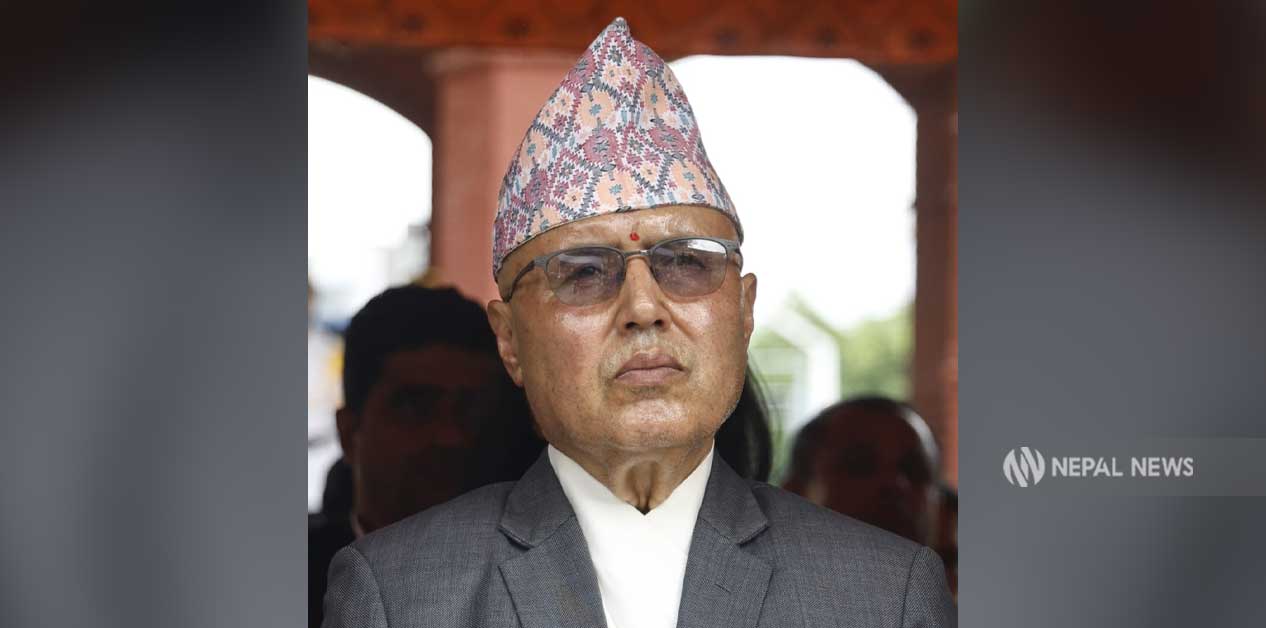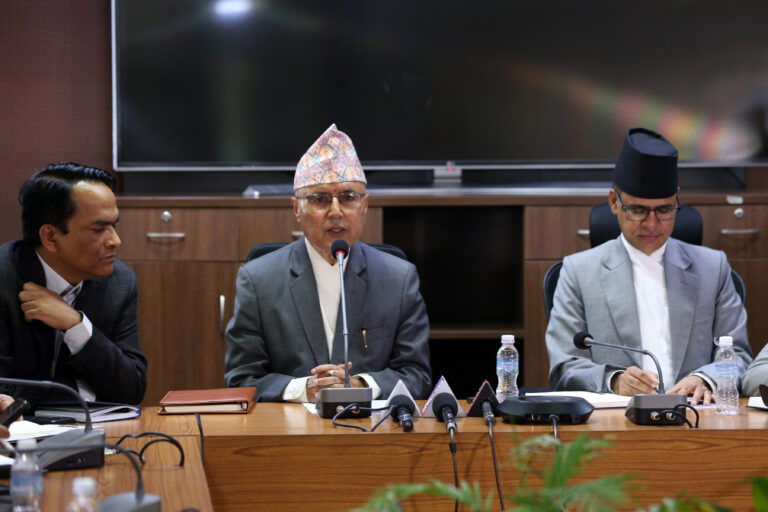
People expect Khanal to deliver economic governance and prudent resource mobilization

KATHMANDU: Rameshore Khanal, who resigned from the Finance Ministry a decade and a half ago, has now returned as Finance Minister, holding the keys to the nation’s treasury. In March 2011 he stepped down as Finance Secretary after a dispute with then Finance Minister Bharat Mohan Adhikari, ending his one-year tenure. Yet, Nepal’s economy continued to follow him even after his exit.
Khanal now takes charge as the seniormost minister in the interim government formed after the Gen Z protests uprooted the power base of the two major political parties. With his expertise in economics and his reputation for administrative integrity, Khanal shoulders the burden of reviving an economy shattered by the protests.
Political and administrative experience
As a brilliant student, Khanal passed written exams for Nepal Rastra Bank, Rastriya Banijya Bank, and the Public Service Commission simultaneously, eventually choosing the Public Service Commission, where he served as a section officer for 16 years. In 1996, he was promoted to Under-Secretary in the accounting group through open competition, serving at the Office of the Auditor General. By 2002, he was transferred to the Finance Ministry and in 2006, promoted to Secretary.
During his tenure at the Finance Ministry, he worked in the Budget Division, the most crucial unit responsible for drafting the budget. His experience gave him deep knowledge of the Finance Ministry’s role and its coordination with the Cabinet, National Planning Commission, Nepal Rastra Bank, and other agencies. Later, under former Prime Minister KP Sharma Oli’s government, he chaired the High-Level Economic Advisory Commission and submitted a nearly 400-page report recommending measures such as curbing wasteful spending and eradicating corruption.
After leaving the Finance Ministry, Khanal served as Economic Adviser to then Prime Minister Dr. Baburam Bhattarai and later became the head of the Economic Policy Department of the then Naya Shakti Party. However, he did not stay long, eventually joining the Nepali Congress in 2013 with hopes of running in elections but failed to secure a ticket. More recently, under Oli’s leadership, Finance Minister Bishnu Poudel appointed him chair of the High-Level Economic Reform Commission.
There were also discussions at various times about his potential appointment as Vice-Chairman of the National Planning Commission or Governor of Nepal Rastra Bank. Now, as Finance Minister in the interim government formed after the Gen Z uprising, Khanal is tasked with leading the campaign to root out corruption and misgovernance and establish good governance.
Mountain of challenges
On September 9, the protests engulfed Singha Durbar, the Finance Ministry, and subordinate offices in flames. At present, the finance administration is barely able to deliver basic services. The Ministry, Customs and Tax Offices, the Office of the Financial Comptroller General, and other government institutions have been damaged by arson and vandalism.
According to Finance Ministry spokesperson Tanka Prasad Pandey, 25 ministry vehicles were completely destroyed, while around 20 others were partially damaged. Some 40 motorcycles were burned, and several units of the Budget Division were destroyed. Subordinate offices are inoperable, creating obstacles for financial administration.
Madan Dahal, Director General of the Inland Revenue Department, reported that many tax offices outside Kathmandu are not functional. Offices in Damak, Itahari, Biratnagar, Lahan, Janakpur, Hetauda, Birgunj, Simara, Damauli, Pokhara, Bhairahawa, Butwal, Nepalgunj, Dadeldhura, and Dhangadhi were completely destroyed.
Similarly, Department of Customs spokesperson Kishor Bartaula confirmed severe damage to customs offices in Bhadrapur, Kakarbhitta, Biratnagar, Bhairahawa, Kailali, and Janakpur. Beyond finance, offices under other ministries were also ravaged, with most police stations in Kathmandu Valley and major cities burned.
Even Singha Durbar, Parliament, the President’s Office, Supreme Court, Special Court, and Kathmandu District Court lost buildings and records. The private sector also suffered massive destruction, leaving business morale shattered.
Khanal’s challenge begins here: first, to make the Finance Ministry fully operational. From reviving broken government structures to restoring public service, the Finance Ministry must mobilize resources. For the current fiscal year, Rs 407.79 billion has been allocated for development. Reconstruction and election expenses must be managed within this budget.

Finance Minister Rameshore Khanal delivers remarks at Monday’s Ministry assumption of office ceremony. Photo:Nabin Paudel/RSS
At his swearing-in on Monday, Khanal emphasized the urgency of these challenges. With elections already announced for March 5, 2026, resource management is a key test. While development must continue, reconstruction and elections must also be carried out simultaneously, increasing the burden on the state treasury.
Revenue and aid concerns
The government’s primary income source—revenue—faces a crisis as revenue offices lie in ruins and businesses that pay taxes have been reduced to ashes. The private sector is stunned, though it has pledged to recover. However, revenue collection will fall short of expectations.
Meanwhile, Nepal’s graduation from least-developed to lower-middle-income country status has prompted bilateral and multilateral donors to cut aid. The World Bank has raised Nepal’s loan interest rate from 0.75% to 1.5%. It remains uncertain how donor countries will perceive the current changes and whether they will continue support.
Nepal is also on the FATF grey list for money laundering and terrorist financing risks. This affects donor support and signals weak control over financial crimes such as corruption, tax evasion, hundi (an informal system of transferring money), cryptocurrency trade, illegal arms, and human trafficking. The Finance Ministry will play a central role in getting Nepal off the grey list.
The interim government itself is a product of the rebellion against corruption and misrule. Its key responsibility is to ensure transparency and efficiency in governance. Eradicating corruption and delays in state institutions must give citizens a real sense of change.
Customs offices are notorious hubs of corruption, and the Inland Revenue Department also carries a bad reputation. Khanal himself previously suggested dissolving the Revenue Investigation Department under the Prime Minister’s Office. Delays in project implementation drain national resources—an area citizens demand urgent reform.
Economist Keshav Acharya, who once worked as an adviser to the Finance Ministry, praised Khanal’s appointment, saying: “He knows the ministry’s history and has administrative experience. But the challenges are equally daunting.”
Acharya added that since the private sector has suffered destruction and low morale, Khanal must prioritize encouraging businesses, while also fast-tracking development and reconstruction of destroyed infrastructure.
As Finance Minister, expectations are high that Khanal will ensure maximum use of the state treasury, introduce taxpayer-friendly administration, and spearhead anti-corruption reforms. Whether he can live up to these expectations will be the test of his tenure—one the future will measure closely.